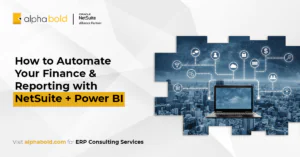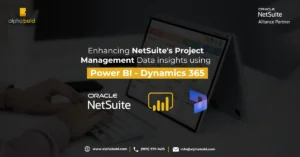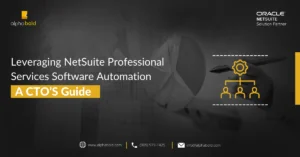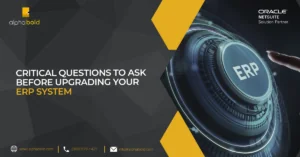Table of Contents
Introduction
In today’s fast-paced and dynamic business environment, companies seek ways to streamline their operations and gain a competitive advantage. This is where Enterprise Resource Planning (ERP) systems come into play. ERP software provides an integrated view of a company’s core business processes, often in real-time. This comprehensive guide will dive into the world of ERP, covering what it is, how it works, and its benefits for businesses.
What is ERP?
At its core, ERP is a suite of integrated software applications that help businesses manage their core processes, such as finance, manufacturing, inventory, human resources, and customer relationship management (CRM). The purpose of understanding such systems is to provide a single, central repository for all business data, accessible to all departments, providing real-time insights, and automating key processes. ERP systems can be deployed on-premises or in the cloud, depending on the business’ needs. These software solutions comprise multiple ERP modules, each responsible for managing a specific area of the business. For example, a finance module will manage all financial transactions and records, while a manufacturing module will handle production planning and scheduling. Each module can be used independently, but they are connected in a single integrated system, providing one centralized view of the business.
ERP software features collect and store data in a single database, ensuring consistency and up-to-dateness. This architecture streamlines business processes, provides real-time insights, and helps eliminate the need for manual data entry and management.
Key ERP Features
At its core, such systems centralize the data from different business departments into a single unified system. This allows for better organizational communication, decision-making, and operational efficiency. Here’s a breakdown of the primary ERP functions that make it such a great tool:
- Centralized Database: One of the primary ways these systems work is by providing a centralized database that stores all the information related to different business processes. This means that data from finance, HR, sales, procurement, and other departments is housed in a single location.
- Integration and Automation: Instead of having isolated systems for each department, the system integrates them, allowing for automated data flow between functions. This ensures real-time data accessibility and minimizes the chance of errors due to manual data entry or transfers.
- ERP Modules: Such systems are often modular, meaning organizations can choose the necessary components. Each module focuses on a specific business process. For instance, there might be modules for inventory management, financial accounting, or customer relationship management. The modularity ensures that organizations don’t pay for or implement functionalities they don’t need.
- User Interface: Another aspect of it’s operation is its user interface. A good system provides users with an intuitive interface to access, modify, and analyze data as needed. This ensures that users from various departments can leverage the system effectively.
- Reporting and Analytics: With data from various departments centralized, these systems can provide powerful reporting and analytics tools. Businesses can extract meaningful insights from their data, helping them make informed decisions.
- Scalability: As organizations grow, so do their needs. A significant aspect of how ERP works is its ability to scale. Companies can add new modules or functionalities as required, ensuring that the system remains relevant and useful.
- Customization: ERP systems can often be customized to fit an organization’s unique needs and processes. This ensures the software aligns well with the company’s operational structure and goals.
Don't Just Hear About It – See It For Yourself!
Want to understand ERP and how it fits your business needs? Book a free call with AlphaBOLD experts with experience implementing tailored ERP solutions.
Request a DemoWhat is ERP – Key benefits
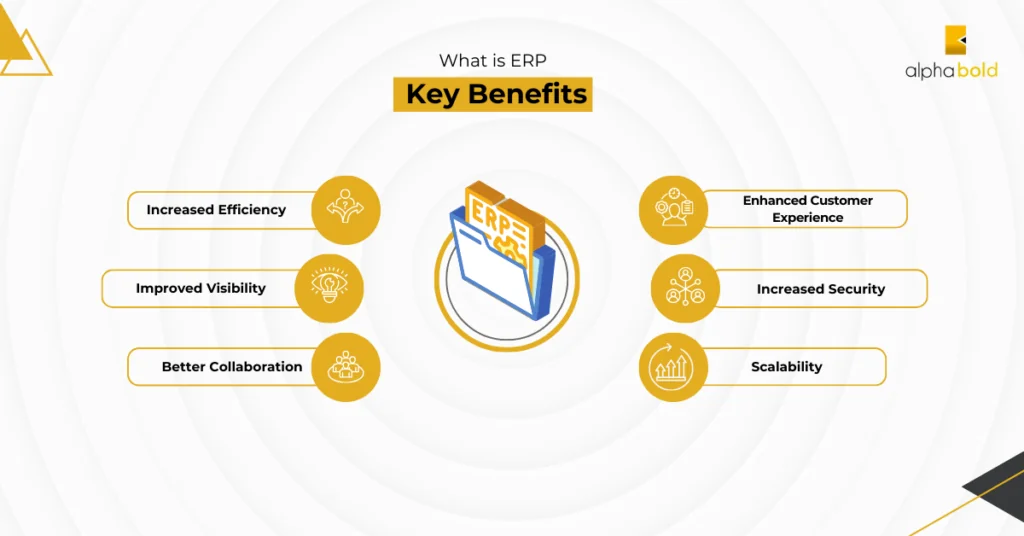
By implementing an ERP system, your business can reap numerous benefits to help you achieve your business goals.
- Increased Efficiency: One of the main benefits of such systems is increased efficiency. Instead of using multiple software applications and systems, an ERP centralizes all business operations into one platform. This allows easy access to important data, improving decision-making and department collaboration. Furthermore, ERP capabilities automate many manual tasks, such as data entry and reporting, reducing the risk of errors and freeing up time for your employees to focus on more critical tasks.
- Improved Visibility: With such a system, you can gain better visibility into your business operations. You can monitor your inventory levels, sales performance, and financial metrics by accessing real-time data. This lets you identify potential issues and make informed decisions to improve your business processes. Additionally, the system can provide insights into your customer behavior and preferences, allowing you to tailor your marketing and sales strategies to meet their needs better.
- Better Collaboration: Collaboration is critical to any successful business, and the system can facilitate collaboration between departments. By centralizing all your business operations into one platform, employees from different departments can easily access the same data and communicate more efficiently. This leads to better coordination, increased productivity, and faster response times to customer inquiries.
- Enhanced Customer Experience: Such systems can also improve the overall customer experience. You can respond to customer inquiries quickly and efficiently by having access to real-time data. Such a system can help you track customer behavior and preferences, allowing you to provide a more personalized experience. Using an ERP system to streamline your operations, you can ensure that your products and services are delivered promptly and consistently, increasing customer satisfaction and loyalty.
- Increased Security: Data security is a significant concern for any business. An ERP system can help maintain data security by centralizing and encrypting sensitive information. This reduces the risk of data breaches and ensures that confidential information is protected. Additionally, it allows you to control access to sensitive information, limiting it to only those employees who need it.
- Scalability: As your business grows, it’s essential to have a system that can grow with you. ERP systems are highly scalable and can accommodate your business’s changing needs. Whether you add new products, expand into new markets, or increase your workforce, such a system can adapt to your changing needs, making it a long-term solution for your business.
Read More about ERP Software Comparison: Key Insights for Executives
Fundamental ERP modules:
- Finance: This module manages financial transactions, including accounts payable and receivable, general ledger, and cash management. It also includes features for budgeting, forecasting, and financial reporting.
- Human Resources: The HR module manages employee information, including payroll, benefits, attendance, and performance tracking. It also includes features for recruitment, training, and succession planning.
- Supply Chain Management: This module manages the supply chain, including procurement, inventory management, and order fulfillment. It also includes demand forecasting, production planning, and supplier management features.
- Manufacturing: The manufacturing module manages the production process, including scheduling, resource allocation, and quality control. It also includes features for product design, bill of materials, and work order management.
- CRM: The CRM module manages customer data, including sales orders, marketing campaigns, and customer support. It also includes customer segmentation, lead tracking, and sales forecasting features.
Each of these modules can be customized and configured to meet the specific needs of a business. By integrating these modules into a single system, businesses have a comprehensive view of operations and enable better-informed decision-making.
What is ERP & What are Financials?
ERP and financials are related but distinct concepts in business management software. Financials is the software that manages a company’s financial transactions, such as accounts payable, accounts receivable, general ledger, and financial reporting. It typically includes modules for managing financial transactions, including financial statements, tax calculations, and billing. On the other hand, ERP is a broader term that refers to a suite of integrated software applications that help organizations manage their core business processes, such as inventory and order management, production scheduling, human resources, and customer relationship management, in addition to financials.

Conquer ERP Selection With Our Free Checklist
Streamline your ERP selection process with our comprehensive checklist, ensuring you make informed decisions for your business's future success.
Learn more
NetSuite – The Ultimate ERP Platform
NetSuite is a cloud-based ERP system that provides advanced business functionality. It is a fully integrated platform that includes modules for financial management, supply chain management, inventory management, order management, customer relationship management, and e-commerce.
Read more about Benefits of NetSuite ERP Platform for Growing Businesses
How does NetSuite work?
NetSuite is designed to be flexible and scalable, making it suitable for small and mid-sized businesses and large enterprises. NetSuite is also customizable, allowing companies to tailor the system to their specific needs. With its cloud-based architecture, NetSuite provides real-time access to data and enables users to access the system from anywhere with an internet connection.
Further Reading Why Choose NetSuite ERP to Improve Business Performance?
NetSuite ERP Software Features:
Additionally, NetSuite offers a variety of add-on modules and integrations, making it a powerful solution for businesses looking to streamline their operations and improve their overall efficiency.
- All-in-one solution: It offers a comprehensive, all-in-one solution that can handle all your business needs, from financial management to CRM and everything in between. With NetSuite, you’ll have access to a complete suite of tools and applications that will help you manage your entire business from a single platform. This saves time and resources and reduces the risk of errors when using multiple software applications.
- Customizable: It is highly customizable, which means you can tailor it to meet the unique needs of your business. Whether you need to customize your workflows, reports, or dashboards, NetSuite provides the tools you need to make it happen. This level of customization ensures that you’re getting the most out of your system and that it is working for you, not against you.
- Scalability: One of the most significant NetSuite features is its scalability. NetSuite can grow with you, whether you’re a small business just starting or a large enterprise looking to expand. You can start with a basic package and add additional features and applications as your business grows and your needs change. This scalability ensures that you’re not paying for features and applications you don’t need and only pay for what you use.
- Real-time visibility: It provides real-time visibility into your business operations, which means you always have the most up-to-date information at your fingertips. This visibility can help you make informed decisions and act quickly. With NetSuite, you can track sales, inventory, finances, and more in real-time, giving you a complete picture of your business.
- Cloud-based: Finally, it is a cloud-based system, which means you can access it anywhere anytime. Whether in the office, on the go, or working remotely, you can access NetSuite from any device with an internet connection. This flexibility ensures you can always stay connected to your business and on top of your operations.
Read more about NetSuite ERP: A Cost and ROI Guide for Executives
Discover What ERP Really Means for Your Business
Still wondering what is ERP and how it can drive efficiency and growth? Let our experts walk you through the possibilities, tailored to your industry and goals.
Request a DemoConclusion
In conclusion, ERP systems are an essential tool for modern businesses. They provide a comprehensive view of the business, allowing for streamlined processes and improved decision-making. Integrating the various modules of the system will enable businesses to automate many of their day-to-day operations, freeing up time and resources to focus on more strategic initiatives. With the emergence of cloud-based systems like NetSuite, businesses of all sizes can take advantage of the benefits of ERP without the need for significant upfront investment or complex IT infrastructure. As technology evolves, we can expect these systems to become even more advanced and accessible.




